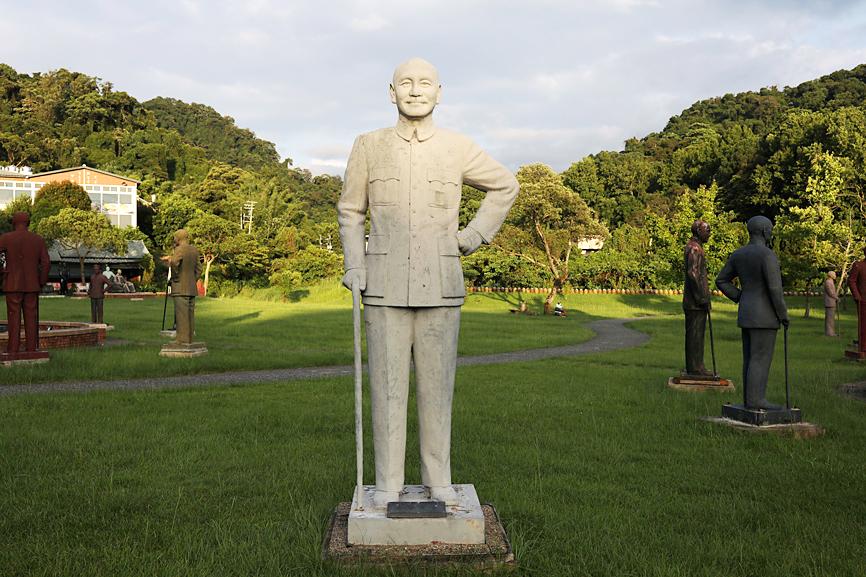As of this month, 54 organizations have completed plans to remove, or have already removed, icons of authoritarian rule from public spaces in compliance with the Transitional Justice Commission’s regulations.
The Central Police University and the Taiwan Police College have agreed to rename their Zhongzheng halls, while the college also plans to remove two statues of former president Chiang Kai-shek (蔣介石).
The Executive Yuan’s Central Taiwan Joint Services Center moved a statue of Chiang to Taoyuan’s Cihu Memorial Sculpture Park, while a statue at Taian Service Area in Taichung, the largest statue at a rest station on a national freeway, is to be removed next year, the source said.

Photo: Ann Wang, Reuters
The statue of Chiang at Chiayi County’s Jhaoping Station has been removed, while three statues at the Ministry of Justice offices in New Taipei City, Taoyuan and Changhua County have been removed, the commission said.
The Zhongzheng Building under the Ministry of Civil Service’s Muzha Office in Taipei’s Wenshan District (文山) would be renamed and its plaque would be removed this summer, the commission added.
Fourteen statues of Chiang Kai-shek and two portraits of former president Chiang Ching-kuo (蔣經國) at companies affiliated with the Ministry of Economic Affairs have been removed, while a half-bust of Chiang Kai-shek has been repurposed as a windmill, the commission said.
A statue of Chiang Kai-shek at the Chiayi County Tourism Bureau has been blocked from sight with a display panel, while the statue of him at Taitung County Airport was removed last year, the commission said.
Five of his statues at Coast Guard Administration bases — three at Kaohsiung bases, and one each in Taoyuan and Taitung — were removed, while the name Zhongzheng was struck from platforms at the bases, the commission said.
The Fishery Agency has put into storage a Chiang Ching-kuo relief originally featured in its Keelung office, the commission said.
Three statues of Chiang Kai-shek at homes for elderly people under the Ministry of Health and Welfare were removed, the commission said.
The commission did not arbitrarily state how the statues should be handled, and most of the methods were proposed by the respective agencies, Commissioner Deputy Director Yeh Hung-ling (葉虹靈) said.
Except for the Ministry of National Defense, the Veterans Affairs Council and the Ministry of Education, there are still 38 places where “icons of authoritarian rule” remain unprocessed, Yeh said.
The commission would continue to work with governmental agencies and convey to them what transitional justice symbolizes and how they could implement it, Yeh said.

Taiwan has received more than US$70 million in royalties as of the end of last year from developing the F-16V jet as countries worldwide purchase or upgrade to this popular model, government and military officials said on Saturday. Taiwan funded the development of the F-16V jet and ended up the sole investor as other countries withdrew from the program. Now the F-16V is increasingly popular and countries must pay Taiwan a percentage in royalties when they purchase new F-16V aircraft or upgrade older F-16 models. The next five years are expected to be the peak for these royalties, with Taiwan potentially earning

POSITIVE DEVELOPMENT: Japan and the US are expected to hold in-depth discussions on Taiwan-related issues during the meeting next month, Japanese sources said The holding of a Japan-US leaders’ meeting ahead of US President Donald Trump’s visit to China is positive news for Taiwan, former Japan-Taiwan Exchange Association representative Hiroyasu Izumi said yesterday. After the Liberal Democratic Party’s landslide victory in Japan’s House of Representatives election, Japanese Prime Minister Sanae Takaichi is scheduled to visit the US next month, where she is to meet with Trump ahead of the US president’s planned visit to China from March 31 to April 2 for a meeting with Chinese President Xi Jinping (習近平). Japan and the US are expected to hold in-depth discussions on Taiwan-related issues during the

‘LIKE-MINDED PARTNER’: Tako van Popta said it would be inappropriate to delay signing the deal with Taiwan because of China, adding he would promote the issue Canadian senators have stressed Taiwan’s importance for international trade and expressed enthusiasm for ensuring the Taiwan-Canada trade cooperation framework agreement is implemented this year. Representative to Canada Harry Tseng (曾厚仁) in an interview with the Central News Agency (CNA) said he was increasingly uneasy about Ottawa’s delays in signing the agreement, especially as Ottawa has warmed toward Beijing. There are “no negotiations left. Not only [is it] initialed, we have three versions of the text ready: English, French and Mandarin,” Tseng said. “That tells you how close we are to the final signature.” Tseng said that he hoped Canadian Prime Minister Mark Carney

STAY IN YOUR LANE: As the US and Israel attack Iran, the ministry has warned China not to overstep by including Taiwanese citizens in its evacuation orders The Ministry of Foreign Affairs (MOFA) yesterday rebuked a statement by China’s embassy in Israel that it would evacuate Taiwanese holders of Chinese travel documents from Israel amid the latter’s escalating conflict with Iran. Tensions have risen across the Middle East in the wake of US and Israeli airstrikes on Iran beginning Saturday. China subsequently issued an evacuation notice for its citizens. In a news release, the Chinese embassy in Israel said holders of “Taiwan compatriot permits (台胞證)” issued to Taiwanese nationals by Chinese authorities for travel to China — could register for evacuation to Egypt. In Taipei, the ministry yesterday said Taiwan